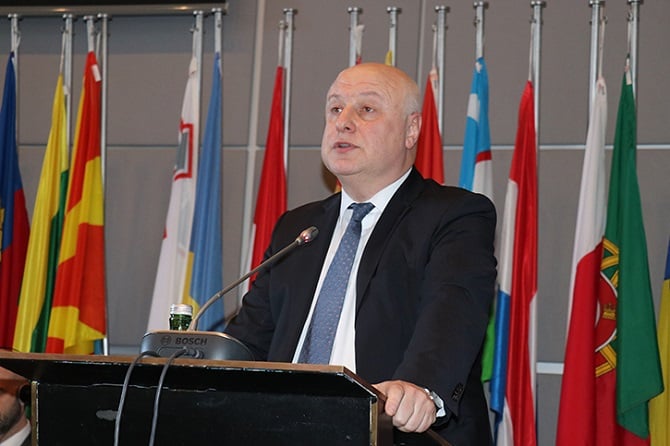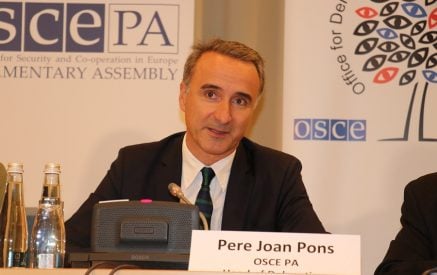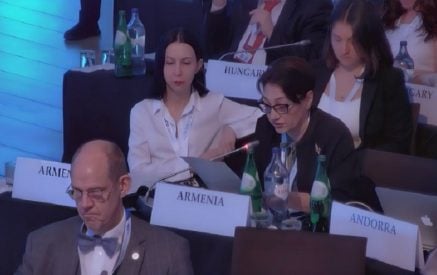Op-ed published at Euronews
31 March 2020
By George Tsereteli (MP, Georgia)
One of the paradoxes of the COVID-19 crisis is that in order to develop an effective collective response, risks need to be taken by individuals. Frontline responders – the health care workers, doctors and nurses – are those at the highest risk, and we must do all that we can to support them and ensure that they are adequately protected.
Read also
But there are many other professionals who continue to go to work every day to ensure that vital functions are performed. These include police and military servicemembers, people working in pharmacies, grocery stores, prisons and jails, and those working in manufacturing and supply chains.
As president of the OSCE Parliamentary Assembly representing 56 national legislatures across North America, Europe and Central Asia, I would also highlight the vital work of members of parliament, who are carrying out essential services such as passing economic aid packages and emergency public health measures. They are also struggling to cope with how to do their jobs safely.
What has become clear during this crisis is that the level of co-operation from the general public in following guidelines from governments and experts is closely related to the level of trust that they have in democratic institutions. In order to instill confidence in those institutions, executive and legislative branches need exceptional levels of co-operation, with political differences set aside.
While governments have taken the lead in spearheading the public health response, and in most cases have acted decisively and commendably, there nevertheless should be close co-ordination with parliaments, which therefore must remain functional in this time of crisis.
Many of our parliaments are responding to the threat with innovative techniques to ensure their vital functions can continue. Lawmakers in some countries are telecommuting and meeting only for coronavirus-related emergency sessions in nearly empty chambers while maintaining safe distances from one another, and sometimes voting remotely.
There are also parliaments that have been forced to close down. The British Parliament, for example, has adjourned amid fears that coronavirus has been spreading through Westminster with least 20 MPs in the UK having confirmed or suspected cases. This is a stark reminder that while parliamentarians may enjoy some privileges and immunities, they are not immune to illnesses like COVID-19. Indeed many of our colleagues are affected by this outbreak.
While the British decision to shutter parliamentary activity is understandable considering the circumstances, I hope that this is the exception rather than the rule. The extraordinary tasks of combating COVID-19 and addressing its related economic challenges require strong international solidarity and co-operation at all levels. Parliaments must play a central role in the decision-making process.
While we all look to one another for best practices to ensure an effective international response to the coronavirus pandemic, we can also learn from one another how to ensure that parliamentary activities can continue. We can look, for example, to our colleagues in the European Parliament who are temporarily allowing electronic voting as MEPs are working remotely.
Whatever the system agreed to by individual parliaments, I hope that in these extraordinary times, we can develop extraordinary and innovative responses to ensure the continuity of parliamentary democracy. As the most direct link between governments and their people, parliamentarians have a duty to promote a coherent public policy response and communicate with the people.
Parliaments remain one of the only institutions that offer a sense of normalcy during this period. They provide oversight to ensure that emergency measures are implemented properly, that economic relief funds are disbursed where they are needed, that abridgements of freedoms are proportionate and temporary, and that security and stability are upheld. This work cannot be stopped.
We in the OSCE Parliamentary Assembly stand ready to assist national parliaments and work with governments in sharing best practices and ensuring that their essential services continue. In a virtual meeting of the Assembly’s leadership last week, we heard from the President of the hard-hit Lombardy Region of Italy, Attilio Fontana, who provided a briefing about the situation in his region and appealed for assistance. This was an emotional reminder of the need for solidarity and the urgency of making timely decisions on advancing a strong transatlantic response to the crisis.
The Parliamentary Assembly supports all international organizations and institutions working together, including within the OSCE. The time now is for unity and not political or institutional divisions.
OSCE PA leaders will meet regularly in an online forum to help ensure that the international response to the crisis reflects values of solidarity and responsibility-sharing, that doctors and medical equipment are deployed where they are needed most, and that migrants and people living in conflict zones get the support they need. We also must combat fake news, promote food and water security, and place human rights at the center of the response.
For this response to be both comprehensive and legitimate, parliamentarians must be at the forefront and fulfill their first obligation to serve the people.
George Tsereteli is a Member of Parliament from Georgia and serves as President of the OSCE Parliamentary Assembly. Follow him on Twitter: @GTsereteli
OSCE PA



























































